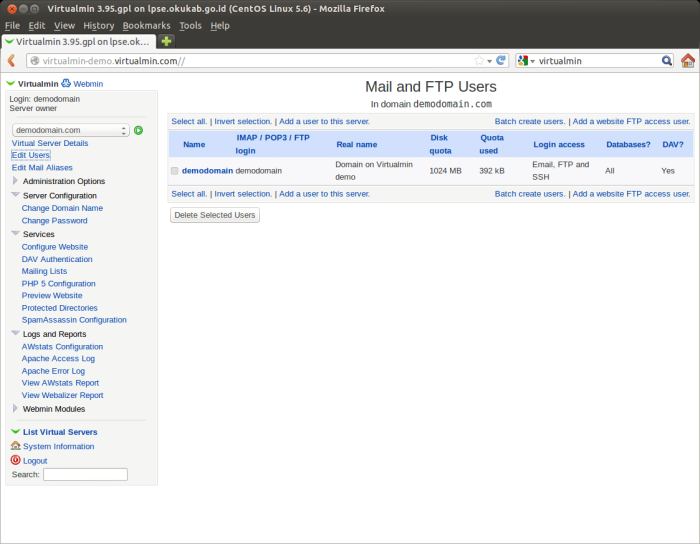Virtualmin is an open source domain hosting and website control panel, which offers the ability to create and manage many domains and is available in both open source and commercial versions. Manage your virtual domains, mailboxes, databases, applications, and the entire server, from one comprehensive and friendly interface. It is based on Webmin.
Virtualmin supports CentOS, RHEL, Scientific Linux, Debian, Ubuntu, Amazon Linux, and FreeBSD.
There are two versions of Virtualmin, a freely distributable version released under the GPL, and a commercial version released under a proprietary license which includes additional functionality.
Features include:
- Four ways to manage a server: Web, command line, mobile device and remote API.
- Easy to install and update dozens of web applications, including blogs such as WordPress, CMS like Joomla and Drupal, wikis including MediaWiki and DokuWiki.
- Simple WYSIWYG HTML editor in the File Manager application development frameworks like Ruby on Rails and Django.
- Complete, simple to use, remote and command line API. Flexible and open API for creating third party modules.
- Email management:
- Multiple email accounts.
- Antivirus – on a per-user and per-domain basis. It uses ClamAV.
- Antispam – on a per-user and per-domain basis with automatic spam clearing. It uses the popular SpamAssassin.
- Forwarders.
- Mailbox quota.
- DomainKeys.
- DKIM – a standard for signing email messages so that the recipient can verify the sender’s email address. This allows recipient mail servers to detect sender address forgery, which is often used by spammers to avoid sender domain blacklists. Virtualmin uses a milter to implement DKIM signing and verification.
- Automatic DNS slave configuration features – automatically manage any number of DNS slave servers.
- Supported Backends:
- Web server:
- Lighthttpd.
- Apache.
- Nginx – a lightweight webserver that supports most of the functionality of Apache, but is faster and uses less memory.
- FTP server:
- PureFTPd.
- Vsftp.
- ProFTPd.
- Mail:
- Dovecot.
- Courier.
- Sendmail.
- Postfix.
- Database (with the option of using remote databases):
- PostgreSQL.
- MySQL.
- Programming languages:
- PHP.
- Perl.
- Python.
- Installation and management of the Django web application development framework, and installation of new Django applications from the Install Scripts interface.
- Support for setting up Ruby on Rails in a virtual server.
- Optional mode for PHP Pear.
- Optional mode for Ruby Gems.
- Web server:
Website: www.virtualmin.com
Support: Documentation
Developer: Virtualmin, Inc
License: GNU General Public License v2.0

Virtualmin is written in Perl. Learn Perl with our recommended free books and free tutorials.
Return to Web Hosting Control Panels
| Popular series | |
|---|---|
| The largest compilation of the best free and open source software in the universe. Each article is supplied with a legendary ratings chart helping you to make informed decisions. | |
| Hundreds of in-depth reviews offering our unbiased and expert opinion on software. We offer helpful and impartial information. | |
| The Big List of Active Linux Distros is a large compilation of actively developed Linux distributions. | |
| Replace proprietary software with open source alternatives: Google, Microsoft, Apple, Adobe, IBM, Autodesk, Oracle, Atlassian, Corel, Cisco, Intuit, and SAS. | |
| Awesome Free Linux Games Tools showcases a series of tools that making gaming on Linux a more pleasurable experience. This is a new series. | |
| Machine Learning explores practical applications of machine learning and deep learning from a Linux perspective. We've written reviews of more than 40 self-hosted apps. All are free and open source. | |
| New to Linux? Read our Linux for Starters series. We start right at the basics and teach you everything you need to know to get started with Linux. | |
| Alternatives to popular CLI tools showcases essential tools that are modern replacements for core Linux utilities. | |
| Essential Linux system tools focuses on small, indispensable utilities, useful for system administrators as well as regular users. | |
| Linux utilities to maximise your productivity. Small, indispensable tools, useful for anyone running a Linux machine. | |
| Surveys popular streaming services from a Linux perspective: Amazon Music Unlimited, Myuzi, Spotify, Deezer, Tidal. | |
| Saving Money with Linux looks at how you can reduce your energy bills running Linux. | |
| Home computers became commonplace in the 1980s. Emulate home computers including the Commodore 64, Amiga, Atari ST, ZX81, Amstrad CPC, and ZX Spectrum. | |
| Now and Then examines how promising open source software fared over the years. It can be a bumpy ride. | |
| Linux at Home looks at a range of home activities where Linux can play its part, making the most of our time at home, keeping active and engaged. | |
| Linux Candy reveals the lighter side of Linux. Have some fun and escape from the daily drudgery. | |
| Getting Started with Docker helps you master Docker, a set of platform as a service products that delivers software in packages called containers. | |
| Best Free Android Apps. We showcase free Android apps that are definitely worth downloading. There's a strict eligibility criteria for inclusion in this series. | |
| These best free books accelerate your learning of every programming language. Learn a new language today! | |
| These free tutorials offer the perfect tonic to our free programming books series. | |
| Linux Around The World showcases usergroups that are relevant to Linux enthusiasts. Great ways to meet up with fellow enthusiasts. | |
| Stars and Stripes is an occasional series looking at the impact of Linux in the USA. | |
